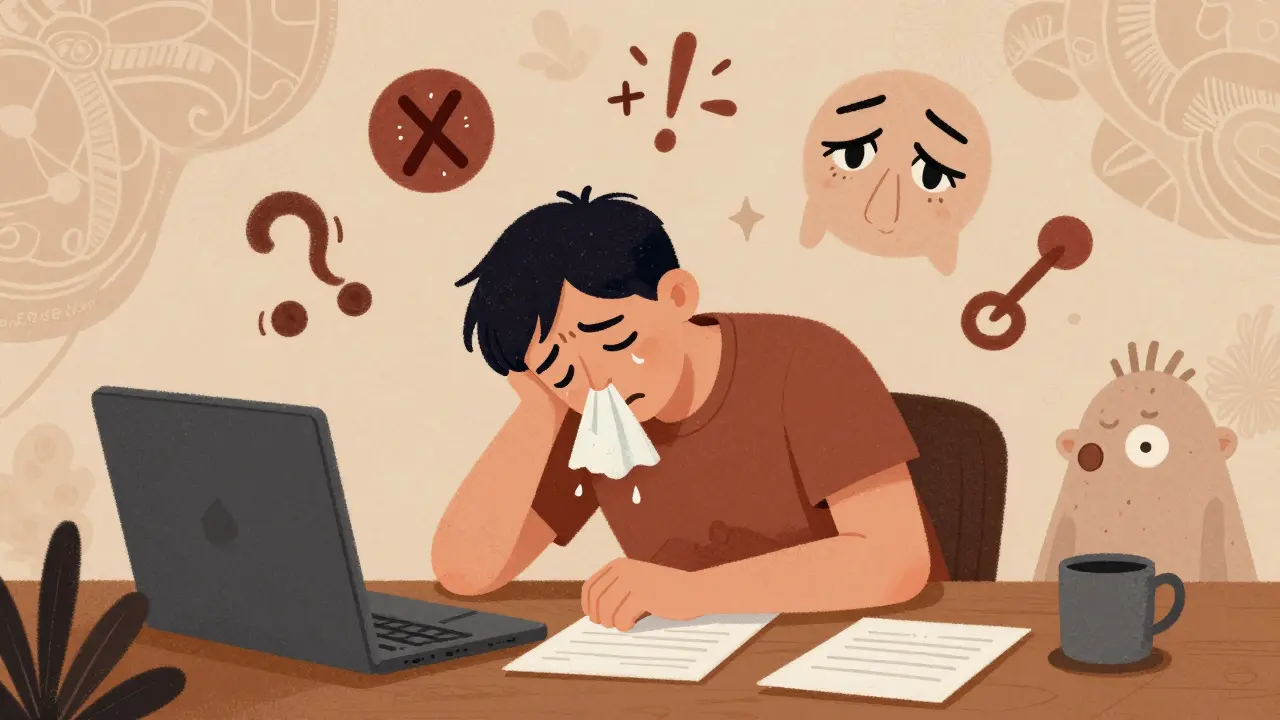Side Effects: What They Are and How to Manage Them
Ever taken a pill and then felt dizzy, itchy, or nauseous? That’s a side effect – an unwanted reaction that shows up when a drug does more than it’s supposed to. Most people think side effects are rare, but they’re actually pretty common. Knowing what to look for can keep you from panicking and help you decide if you need a doctor’s call.
What Are Side Effects?
A side effect is any symptom that appears after you start a new medication. It can be mild, like a dry mouth, or serious, like severe breathing trouble. The same drug can cause different reactions in different people because of age, health, genetics, and other meds you’re using. Some side effects are listed on the drug label, while others show up only after a few weeks of use.
Common side effects include:
- Headache or dizziness
- Nausea, vomiting, or stomach upset
- Fatigue or drowsiness
- Skin rash or itching
- Changes in appetite or weight
Serious side effects are less frequent but need rapid attention. Look out for swelling of the face, trouble breathing, chest pain, rapid heartbeat, or sudden vision changes. If any of these appear, treat it like an emergency and call emergency services.
How to Deal With Them
First, read the medication guide that comes with your prescription. It lists the most likely side effects and tells you what to do if they happen. If you notice a new symptom, don't assume it’s harmless. Try these steps:
- Check the timing. Did the symptom start right after you took the drug? If yes, the link is stronger.
- Consult the label. See if the symptom is listed as a common reaction.
- Contact a professional. Call your pharmacist or doctor if you’re unsure. They can tell you whether to keep taking the medication, lower the dose, or switch to another one.
- Track your experience. Write down the date, dose, and exact symptom. This record helps your provider make a quick decision.
- Stay safe. Never stop a prescription abruptly unless your doctor tells you to. Sudden stops can cause withdrawal or rebound effects.
If the side effect is mild, you might manage it at home. For a headache, a glass of water and a brief rest often help. An itchy rash could settle with an over‑the‑counter antihistamine, but only after checking with a pharmacist.
When you’re on several meds, interactions can cause side effects that aren’t mentioned on any single label. That’s why it’s crucial to keep an up‑to‑date list of everything you take – prescription pills, over‑the‑counter drugs, supplements, and even herbal products.
Finally, remember that not every symptom means a medication is dangerous. Your body sometimes just needs time to adjust. Most side effects ease up after a few days or weeks. If they linger or get worse, that’s a sign to get professional advice.
Bottom line: side effects are normal, but they don’t have to be a mystery. Spot the signs early, use the steps above, and you’ll stay in control of your health while taking the medicines you need.
- Celeste Farnell
- 5-02-26
- Health & Medicine
Cetirizine vs Levocetirizine: Sedation Differences, Side Effects, and Which to Choose
Cetirizine (Zyrtec) and levocetirizine (Xyzal) are common allergy medications. Learn how they differ in sedation, effectiveness, and side effects to find the best option for your needs.
Details- Celeste Farnell
- 23-10-25
- Health & Medicine
Lopinavir and Aging: Essential Patient Guide
A clear guide for seniors on how lopinavir works, dosage tweaks, side effects, drug interactions, and monitoring tips to stay safe.
Details- Celeste Farnell
- 18-10-25
- Health & Medicine
How Zidovudine Affects HIV Treatment Adherence and Outcomes
Explore how zidovudine influences HIV treatment adherence, side‑effects, resistance, and patient outcomes with practical management tips.
Details- Celeste Farnell
- 16-08-25
- Health & Medicine
Imodium (Loperamide) 2025 Guide: Uses, Dosage, Side Effects, and Safe UK Use
Straight-talking guide to Imodium (loperamide): what it does, exact doses, who should avoid it, side effects, and safe UK use in 2025. Includes checklists and FAQs.
Details- Celeste Farnell
- 15-07-25
- Health & Medicine
Solian (Amisulpride): Uses, Effects & What to Know in 2025
Solian (amisulpride) is an antipsychotic prescribed for schizophrenia and mood disorders. Learn how it works, its effectiveness, possible side effects, and what to expect.
Details- Celeste Farnell
- 11-07-25
- Health & Medicine
Prograf: Immunosuppressant Drug Uses, Side Effects & Essential Tips
Uncover what Prograf (tacrolimus) does, how it protects organ transplants, real side effects, and expert tips for safe use. Knowledge for patients and caregivers.
Details- Celeste Farnell
- 7-07-25
- Health & Medicine
Managing Carbidopa-Levodopa-Entacapone Side Effects: Emotional Strategies & Practical Support
Explore how to handle the emotional toll of carbidopa-levodopa-entacapone side effects, with real-life strategies, tips, and support for those living with Parkinson’s.
Details





